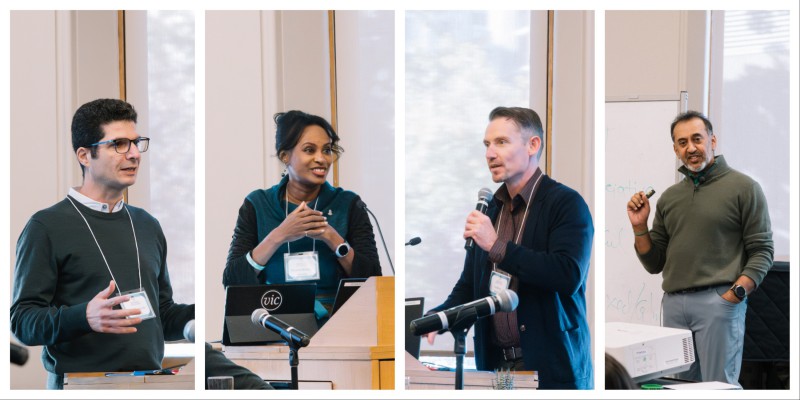Minding Our Minds Conference Looks at Risks of Too Much Screen Time

Dr. Elia Abi-Jaoude, a psychiatrist at the Hospital for Sick Children; Dr. Rhonda McEwen, president of Victoria University; Professor Ira Wells, director of academic programs at Victoria College; and Dr. Izzy Justice, chief neuroscience officer at Neuro580.com, speak at the 12th Minding our Minds conference. (Photos by Will Dang)
By Joe Howell
The statistics about youth mental health are “staggering,” said Dr. Elia Abi-Jaoude, medical director of the Ambulatory Psychiatry Program at the Hospital for Sick Children, during his keynote speech at Victoria College’s 12th Minding our Minds conference.
Canada saw a 75 per cent increase in youth emergency department visits for mental health between 2006 and 2018 and a 65 per cent increase in hospitalizations, said Dr. Abi-Jaoude, who is also an assistant professor of psychiatry at the University of Toronto.
“At the same time, youth hospitalizations over the same time period for all other health conditions went down by 24 per cent,” he said. “You have to wonder what’s going on in society when young people are struggling so much. What’s happening?”
That was one of the central questions on Oct. 19, during the annual conference organized by the Office of the Dean of Students. Past Minding our Minds have addressed such topics as identity and wellness, neurodiverse student wellness, when ambition meets anxiety, and alcohol and other substance abuse in universities. This year’s theme was the impact of screen time on mental wellness.
Dr. Abi-Jaoude’s talk was titled “Digital Media and Youth: The Good, The Bad and The TikTok.” He said that while he did not believe the rise of smartphones and social media told the full story about the youth mental health crisis, technology has clearly contributed to a sharp increase in cyberbullying, anxiety, body-image issues and a host of other concerns facing young people.
Dr. Izzy Justice, chief neuroscience officer at Neuro580.com, gave a presentation titled “The Neurological Paradox of Screen Time,” in which he explained that the “sheer volume of the stimuli we’re feeding our brains” is making it harder than ever for us to concentrate. Globally, we now own more than 18 billion mobile devices, he said.
“The brain is now getting saturated,” he said. “It is fatiguing itself.”
We should ask ourselves three questions when assessing our own screen time, Dr. Justice suggested: “What is the impact of the stimuli? Is it making me more focused or less focused? Is it agitating me, or is it calming me?”
A panel discussion featured Dr. Rhonda McEwen, president of Victoria University, and Professor Ira Wells, director of academic programs at Victoria College, alongside Dr. Abi-Jaoude.
“A lot of the work that I do when it comes to screens is about how we process information coming to us through these different kinds of channels,” said McEwen, who is also the Canada Research Chair in Tactile Interfaces, Communication and Cognition.
Some of her research has focused on emerging technologies and efforts to improve educational technology, or EdTech.
While EdTech is often held up as the “good” kind of screen time, it’s not without risks, said McEwen, who co-authored a 2015 journal article titled “Engaging or Distracting: Children’s Tablet Computer Use in Education.” One of her findings in it was that the design itself of apps or devices can “overload” very young learners, leading to problems with their working memory.
Another study McEwen conducted found that older children’s problem-solving abilities seemed to decrease through excessive screen time, even when playing educational games.
And while investigating the link between sleep quality and technology use in adolescents, McEwen found that blue light and electromagnetic frequencies from cellphones may contribute to poor sleep among teenagers—but the biggest culprit was “every ding and ping and poke and vibrate” emanating from their devices. She said teens were “waking up all hours of the day and night dealing with these requests for communication.”
Professor Wells, who wrote a recent article for The Walrus titled “It’s Time to Take Phones Away from Students,” approached screen time as a cultural critic and an educator. He said we have reached a turning point in the conversation around youth and technology.
“Last March, the TDSB and three other school boards launched lawsuits against the owners of Facebook, Instagram, Snapchat and TikTok for marketing what they described as intentionally addictive products to children and for ‘rewiring the way that children think, act, behave and learn,’” Wells noted.
He highlighted a 2024 survey by the U.S. Bureau of Labor Statistics that found teens 15 and older spend an average of eight minutes a day reading for personal interest. He said this means the typical teenager spends more time on their phone each day than what they’ll spend in a month on reading things for pleasure that aren’t on a screen.

Dean Kelley Castle moderated a lively conversation between Victoria College students Mridula Sathyanarayanan, Armiti Zarbakhsh and Joseph Hill, a Vic intern and grad student at OISE. The trio weighed the benefits of screen time—staying connected to their loved ones, collaborating across distances—against the “power and perils of constant reachability,” as Sathyanarayanan put it.
They shared their personal experiences, discussing how low self-esteem, isolation, frustration and imposter syndrome are so often exacerbated by excessive screen time. The students also discussed their own research on screen time as it relates to meditative practices, intercultural therapeutic models and different ways of teaching that are tech-free.
